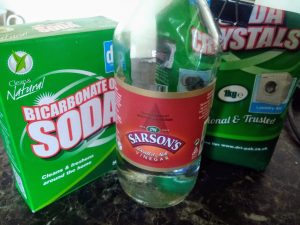
The three main items to keep on hand are soda crystals, white vinegar, and bicarb. You can use the baking sort if you want, but it’s cheaper to get a box full from Home Bargains (Arm & Hammer, or Dri-Pak). The only difference (as far as I can discover) from baking bicarb is that it’s coarser so it would be slightly grittier (so less nice in cakes!). Soda crystals are also cheap, and widely available.
Some of these tips may be new to you. I use all these regularly. (WARNING – don’t mix vinegar or anything with chlorine bleach, it can create a toxic gas. Better still, don’t buy chlorine at all. Switch to powdered Oxy bleach instead, as sold by Ecover or Bio-D.)
- Clean windows with warm water with a drop of detergent and a good glug of white vinegar. I like to scrub with a sponge (it’s usually a long while since I previously did it!) then use a squeegee. Adding a glug of dishwasher Rinse Aid gives extra sparkle!
- To deoderise your fridge, always leave an open tub/box of bicarb at the back to absorb smells.
- Freshen your drains with sprinkling bicarb down. Leave for 10 min, then add some white vinegar and leave a bit longer. Then rinse well with hot or boiling water.
- To de-grease a drain, pour boiling water down the drain followed by soda crystals, leave a while, then plenty of hot water. This is also useful if soap scum is clogging your shower drain. [And it is very useful to have a small plunger available, to help the gunge get moving!]
- For a general purpose surface cleaner, use 250 ml each water and white vinegar, plus a teaspoon washing up liquid. Add an essential oil such as orange or lemon, if you prefer a different smell. Add soda crystals for more power.
- To dissolve lime scale, put white vinegar or citric acid in the toilet bowl for a couple hours (or several, depending on how scaled up it is). Then scrub it off with a scouring sponge and clean inside and out. Repeat soaking if it doesn’t come smooth the first time. Vinegar is an excellent disinfectant and deodoriser.
- Use white vinegar as your laundry rinse, instead of fabric softener. Softener clogs up the fibres, needing more and more washing to get things clean, and vinegar helps strip out any build-up of detergent or softener. It also deodorises, and the slight scent of vinegar you may get straight from the washer won’t be noticeable in 5 minutes.
- To clean your teapot, fill with hot water, 1-2 Tbs oxy bleach powder, a few drops of washing-up liquid, and a handful of soda crystals. Leave the teapot in the sink, it foams over! After a couple hours, empty and wash and rinse. Good for stained mugs, teaspoons, and washing-up bowls, too.
- Oven shelves come clean quite quickly if you soak them first in very hot water and soda crystals (plus a little washing-up liquid to emulsify the grease removed). Use a scouring sponge, or possibly a wire wool pad, to shift any really stubborn bits. Soda crystals and wire wool are your friends for cleaning grease!
- Home-made shower spray – Spray on the wet surfaces of the shower (but not the floor) after the last person showers. The surfactants make the water run off, vinegar acts against lime-scale and soap scum, and discourages mould growth – which leads (for me) to not having to clean the shower much at all.
In an old spray bottle (which I’ve marked with lines at the 100ml and 400ml levels) I combine the following, and shake well:- 100 ml white vinegar
- 300 ml water
- 1 teaspoon washing up liquid or shampoo
- 2 tablespoons (30ml) dishwasher rinse aid
Warning: if you are in a hard-water area, you may well find that hand-made soaps, Castille liquid soap, and many shampoo bars cause a scum to accumulate and clog up the drain more quickly. The most effective prevention I’ve found is to find soaps and shampoo bars that contain some element of detergent, normally sodium lauryl sulphate (SLS) but there are SLS-free substitutes around. (Those “of a certain age” may remember the days of adding a dash of washing up liquid to the bath to prevent the ‘bathtub ring’.)
Happy cleaning, I hope you find these useful.